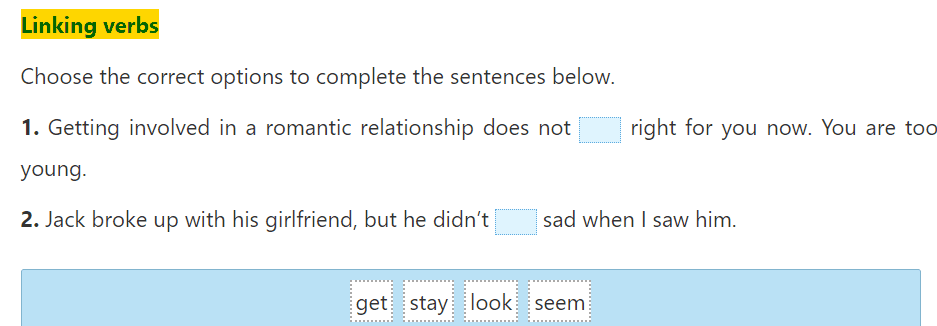Bài học cùng chủ đề
Báo cáo học liệu
Mua học liệu
Mua học liệu:
-
Số dư ví của bạn: 0 coin - 0 Xu
-
Nếu mua học liệu này bạn sẽ bị trừ: 2 coin\Xu
Để nhận Coin\Xu, bạn có thể:

Luyện tập SVIP

Lovely!
Today we are going to review pronunciation, vocabulary and grammar in LOOKING BACK lesson.
Firstly, in terms of pronunciation, we go over falling and rising intonation.
Secondly, in terms of vocabulary, we focus on words and phrases related to ASEAN, its aims, member states and activities.
Thirdly, in terms of grammar, we go over gerunds and state verbs in continuous forms.
Pronunciation
Listen and practise saying the following sentences. Choose the intonation: rising (⤻) or falling (↷).
(Nhấp vào dòng để chọn đúng / sai)
| 1. The Constitution of ASEAN is the ASEAN Charter. |
|
| 2. Did the Charter come into force on December 15th, 2008? |
|
| 3. The Charter is a legal agreement among the ten ASEAN member states. |
|
| 4. Does the Charter set out the basic guiding principles for its member states? |
|
| 5. One of the Charter's principles is the 'Right to live without external interference'. |
|

Vocabulary
Complete the sentences with the words in the box.
1. ASEAN aims to promote peace, security and in the region.
2. We try our best to attract new members to our every year.
3. An agreement between China and ASEAN created the third largest trading in the world.
4. An ASEAN Scholarship holder has to good academic performance to keep the scholarship.
5. Viet Nam received assistance from ASEAN states even before the country joined the bloc.
6. The ASEAN entered into force after the ten members signed it.
(Kéo thả hoặc click vào để điền)
Grammar
Choose the correct verb form in brackets to complete each sentence.

1. Nam expects (to win / winning / win) in the coming competition on ASEAN and the ASEAN Charter.
2. The authorities in Cambodia do not permit (to enter / entering / enter) the country's eco-regions without an official guide.
3. Doctors and nurses risk (to catch / catching / catch) infectious diseases from patients.
4. My parents promised (to take / taking / take) us to Angkor Wat.
5. I recommend (to visit / visiting / visit) the Royal Regalia Museum in the capital city of Brunei.
Grammar
Complete the sentences with the verbs in the box. Use the correct forms.
| complete | speak | find | dance | swim |
1. Tim dreams of in the beautiful waters of Ha Long Bay in Viet Nam.
2. I suggest Lamvong if you are in Laos because it is a good way to relax and make friends.
Grammar
Complete the sentences with the verbs in the box. Use the correct forms.
| complete | speak | find | dance | swim |
3. Our English teacher encourages about places of interest in ASEAN countries.
4. Quang practised in front of his parents so he can prepare for his presentation on ASEAN sports activities.
5. Tuan concentrated on his project on ASEAN last week and was able to submit it on time.
Grammar
Choose the correct verb form to complete each of the sentences.
1. I (feel / am feeling) I should go to Ha Long Bay to relax. I'm too stressed.
2. Can you hear the music? His class (has / is having) a rehearsal for tomorrow's meeting with the ASEAN Youth Delegation.
3. I (look / am looking) out of the window, but can't see him in the street.
4. I can see him at the market. He (smells / is smelling) the fish now.
5. The doctor (feels / is feeling) the boy's leg to see if it is broken.
Grammar
Use the simple or continuous form of the verbs in brackets to complete the sentences.
1. Many Vietnamese parents believe that their children study English because they (recognise) its importance.
2. I (know) that the beaches in Bali, Indonesia, are always full of tourists who are attracted by their beauty.
3. Ven Keo, my pen pal in Laos, changed his mind again. Now he (think) of studying at a university in Viet Nam, not in Singapore.
Grammar
Use the simple or continuous form of the verbs in brackets to complete the sentences.
4. you (remember) visiting the Chocolate Hills, one of the top tourist attractions in the Philippines?
5. - 'How you (feel) now, Mai?'
- 'Oh, much better. Thanks a lot, Dr Lam.'


Bạn có thể đánh giá bài học này ở đây